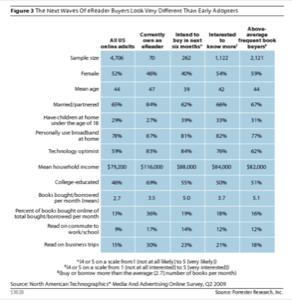According to a new report by Forrester Research’s Sarah Rotman Epps, eBooks and eReaders are slowly but surely becoming mainstream. However, while Amazon is the current market leader among early adopters of this technology, Rotman Epps predicts that later adopters will not feel the same loyalty towards Amazon. This, according to the report, will open up a lot of opportunities for other players in the market, including Sony and large mass-market retailers like Walmart.

According to Forrester’s data, just about 1.5% of all US online consumers currently own an eReader – but it’s important to note that this number is up from 0.6% a year ago. Forrester estimates that about 3 million eReaders will be sold in the US in 2009. By 2013, this number will grow to 13 million. Now, more consumers than ever before are aware of the existence of eReaders (37%) and the number of survey respondents who intend to buy an eReader in the next six months has grown to 6% compared to 2% last year.
Amazon currently has the lead among early eBook adopters. Once eBooks become mainstream, however, Rotman Epps argues, this lead could easily dissipate. While Rotman Epps doesn’t talk a lot about hardware devices in her report, the reality is that the Kindle isn’t exactly a major step forward in the history of industrial design. Early adopters and ‘tech optimists’ (as Forrester likes to call them) are willing to look beyond this, but in the mainstream market, hardware design might play a major role in consumers’ buying decisions.
The Next Wave of eBook Adopters
According to Forrester, the next wave of eBook adopters tends to read more books per months than early adopters and will probably consist of younger males who are less likely to be married and have children. The problem for eReader manufacturers, however, will be to get this group to buy dedicated devices. Rotman Epps argues that a large percentage of this group will probably read eBooks on devices they already own (like the iPhone), unless prices for eReaders come down significantly (under $100).

It’s All About the Price
Forrester’s Rotman Epps argues that the high price of eReaders is currently holding back mainstream adoption. A $99 device, Rotman Epps notes, would bring a lot of additional readers to eBooks and eReaders. Most importantly, though, the eBook and eReader market is still in flux. As the next generation of readers is likely to be very different from the previous generation, Amazon will have to work hard to keep its current lead.
Can Amazon Hold On to Its Lead?
Unlike Rotman Epps, however, we think that Amazon will likely be able to hold on to its current lead. After all, it has already forged strong – though sometimes contentious – relationships with most publishers and it currently offers the best integration between its store and its eReader. Barnes & Noble’s new eBook store will be a strong contender here, though we have yet to see the Plastic Logic eReader device that B&N will use to compete with the Kindle. Sony, too, is making a major push in the eBook market again, though in terms of mindshare in the US, Amazon and the Kindle are currently the clear leaders (both in the mainstream and among early adopters).
While “Later Adopters May Not Be As Loyal To Amazon.com” makes for a good subtitle, the next generation of eBook adopters is just as likely to consider Amazon as the natural place to go to for eBooks, especially given that the company is already the #1 online retailer for regular books.
What About the B2B Market?
The Forrester report only focuses on consumers. We would argue, however, that there is also a large professional market for eReaders, where the current price isn’t too big an issue. Just last week, for example, iRex, an eReader manufacturer that mostly aims for the B2B market, announced the launch of its electronic flight bag for pilots – which is basically an iRex eReader with Jeppesen’s charts loaded on them.
What’s the Killer Product for eReaders?
The Forrester report argues that once eReaders hit the $100 barrier, users will quickly start to adopt these devices. But is price really the only issue here? Are there any other “killer apps” or devices that could drive mainstream adoption even before $99 eReaders become a reality?
Our own Dana Oshiro just argued in our backchannel that a subscription book club (maybe run by Oprah) could bring a lot of new users to eReaders. And then, of course, there is still the mystical Apple tablet that might make for a great eReader – among other things – and which will surely cost more than $99.
Would You Buy an eReader?
What is holding you back from buying an eReader? The iPhone? The price of the current generation of eReaders? Or the well-designed reading solution called ‘the book’?

















